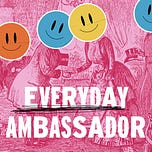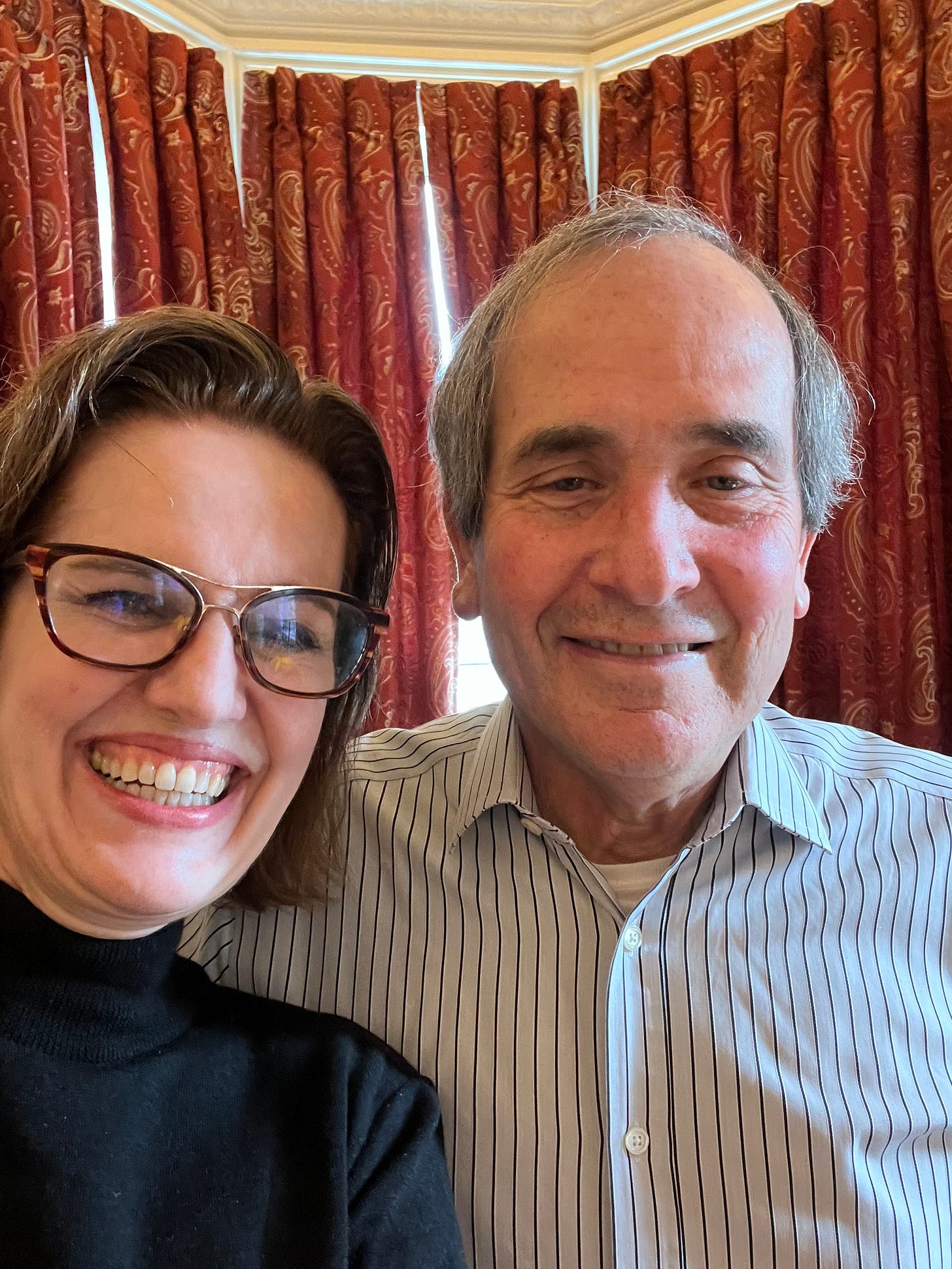One third of Americans believe at least some Russian disinformation. Let that sink in. While you're processing that disturbing statistic, I want to introduce you to someone fighting on the frontlines of truth.
The Truth Detective: Jim Warren's Journey
Longtime journalist and media executive Jim Warren is now the Executive Editor of NewsGuard, an organization dedicated to countering misinformation online. Jim walked me through his career trajectory—from a reporter and eventually managing editor and washington bureau chief of the Chicago Tribune to co-founder of the Chicago News Cooperative, to his current role helping evaluate the credibility of over 10,000 websites and media platforms worldwide.
How NewsGuard Works: Humans not Algorithms
Jim explained how NewsGuard uses trained journalists—not algorithms—to assess the trustworthiness of news content. Their work now informs everyone from Microsoft and the World Health Organization to ad agencies trying to avoid funding disinformation. We discussed the political dynamics of misinformation, how propaganda is intentionally seeded into AI systems, and how the biggest category of misinformation isn't politics—but health. Jim also highlighted the increasing need for media literacy, particularly among students, and the challenges of getting educational institutions to prioritize it.
It's heroic work. And NewsGuard has faced its share of political attacks from MAGA Republicans (as well as grumbling from New York Times editors who didn't like their evaluation of cases in which the Times mixes fact and opinion).
As I listened to Jim describe how NewsGuard's journalists meticulously evaluate news sources, I couldn't help but think about my own media consumption habits. Perusing NewsGuard's catalog of recent viral fake news stories, I even found one I had seen in my Substack feed and accepted as true. What's your approach to verifying the credibility of a headline before sharing it?
However, it's a sad statement about news economy that highly skilled, experienced, professional journalists like Jim are now being redeployed not to create real news, but to debunk fake news. Newspaper are disappearing, or atrophying. Fake news thrives in news deserts.
The Limitations of Fact-Checking
I also query the temporality of this strategy. By definition, NewsGuard's careful analysis and debunking of false claims is always after the fact. The debunking never gets the same amount of attention as the original, salacious claim. The attage attributed to Mark Twain sums it up: “A lie travels around the world before the truth gets its boots on.”
I asked Jim about this question. Does demonstrating that news is fake make a difference, and if so how? He said that this isn't really NewsGuard's piece of the puzzle. They see themselves more as a kind of *Consumer Reports* for the news--they will give you the facts and it's up to you what you do with them.
Might these facts help plaintiffs who have been harmed by fake news to bring legal claims, and in so doing discourage charlatans and political fraudsters? Unlikely. In the US, many fake claims are protected by the First Amendment, and even where this is not the case, digital platforms so far have evaded the legal responsibility that newspapers would have, if they were to publish material that is defamatory. And there's another problem--the global nature of the news. That Russian disinformation machine is way outside of US jurisdiction. It's highly unlikely a Russian court would ever help to enforce the judgment of a US court for defamation or fraud against a Russian government-connected party. So unless the perpetrators happen to have assets in the United States a court could garnish, the chances of recouping the costs of litigation are very low.
Some Possible Solutions: Culture, Tech, and Global Cooperation
So what do we do? Although I'm a lawyer, I have come to believe that solutions are going to come first from culture and the arts. On this point, I hope you'll have a listen to my earlier interview with YouTube celebrity Carlos Espina here:
Get to Know the Algorithm
According to a 2024 Gallup poll, 36 percent of U.S. adults have no trust at all in the media. And another 33 percent of Americans say they have “not very much” confidence in the media. In this era of mistrust and disinformation, there’s an onus on all of us to understand how social media actually works.
Carlos has well over two million followers. Using humor, style, and an open and nonjudgmental approach, he is countering disinformation around immigration. The episode is full of practical ideas. But to sum it up, Carlos' secret is good storytelling, creating a genuine connection with people who don't share your worldview, and a little dose of theater.
Community-sourced journalism and amateur writing on platforms like Substack can also be a part of the solution. Some years ago I organized a project among researchers and practitioners working in journalism, Russian and East European politics, and authoritarianism to support free journalism in authoritarian contexts. To my surprise, the group ended up recommending not support for individual professional journalists at risk, but building up and professionalizing community-based reporting. Why? When everyone is a reporter, regimes have a much harder time shutting the news down. Of course, this comes with the risk that these platforms will be infiltrated by disinformation, and we need some serious community engaged policy-making around what to do about this. We can’t leave it to the platform owners.
There are also exciting initiatives from within the tech world. I recently led a transnational research collective for young academics and engineers from across the world who were together "hacking" solutions to disinformation by creating apps, tripwires within algorithms, and sleuthing platforms.
There's a role for transnational cooperation here too. Looking to analogs like Interpol in the criminal context, an agreement among G7 nations to share information and fast track the enforcement of judgments of any one country against the assets of a foreign perpetrator in any other country would at least elevate the chances of punishment. The Canadian government, hosts of the G7 meeting this year, have put algorithms, AI, and the ethics of technology at the top of the agenda. Let's hope it leads to some real new cooperation.
What You Can Do Today
There's something important each of us can do as citizens: contact our elected representatives and let them know this matters. To take the US example, if Congress were to revise the laws governing social media platforms to create liability for fraud on par with the liability of newspapers, we would see substantial change. Facebook and Twitter's recent backsliding on their already minimal voluntary commitments to police themselves shows that self-regulation will not work. Why on earth should Facebook face less liability for what appears on its site than the Wall Street Journal?
I'm really glad that NewsGuard is doing its work. But I think NewsGuard's journalists would be the first to admit that reporting the facts of disinformation isn't enough. We need a bigger strategy.
To learn more about how you can access NewsGuard’s browser extension or use it in your classroom, visit newsguardtech.com. You can also check out their Substack newsletter, Reality Check, for weekly updates on the state of online information.
What do you think? In a world where disinformation is so easy to produce and feed into algorithms, will we need more NewsGuards, something else, or is this a losing battle? I'd love to hear your thoughts in the comments.
Next week, we'll be shifting to the topic of peace, security, and what we can do to move towards a world free of nuclear weapons. I'll be talking to former Nagasaki Mayor Tomihisa Taue about preparations for the commemoration of the 80th anniversary of the nuclear bombing of Nagasaki this summer, and his work as a leader of Mayors for Peace, an association of 8500 cities from around the world. Subscribe now so you don't miss it. Together, we can build a more informed peaceful, just and sustainable world.















Share this post